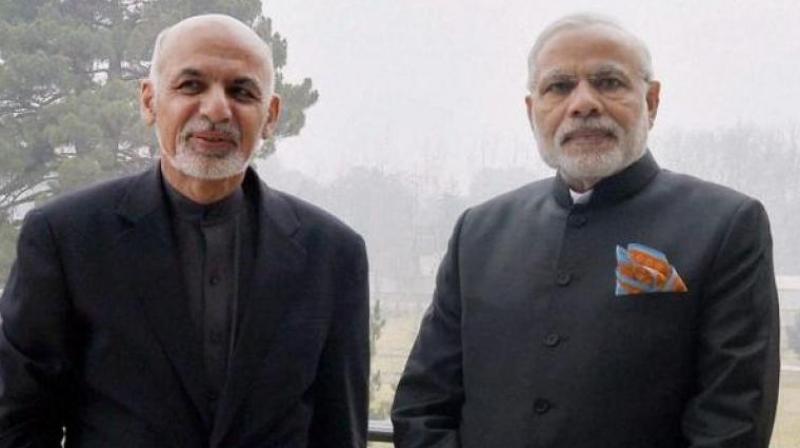There's a hole in the Heart of Asia

As the 6th Heart of Asia (HoA) Conference on Afghanistan begins in Amritsar today, during the winter lull in fighting, the contrast between the 2015 conference in Islamabad, which took place bang at the height of the Afghan President Ashraf Ghani’s rapprochement to Pakistan and the present, could not be more obvious. Ties between Afghanistan and Pakistan have hit a new low while Afghanistan’s relations with India have improved significantly. Globally, there is a rising crescendo over Pakistan’s sponsorship of terror and even some talk of isolating that country.
The run up to this year’s HoA has seen the inauguration of the Salma Dam and India’s announcement to stay committed to the Afghan cause, the drone attack of Taliban’s handpicked chief Mullah Akhtar Mohammad Mansoor in Baluchistan that killed him and further fragmented the Taliban, a reconfirmation of the west’s commitment to Afghanistan at the Brussels Conference, the first Chinese train full of goods reaching Afghanistan via Central Asia, the progress made on the Chabahar port and the inauguration of the Turkmenistan –Afghanistan rail track. Afghanistan, at the crossroads of Asia, has been trying to break the shackles of being landlocked to become land-linked. To a great extent, it has succeeded in finding alternative transit routes to replace the ones to Pakistan.
Outweighing these positives, however, are a string of negatives. Taliban has not only been flexing its muscles in its traditional strongholds, but elsewhere in the country, while building cordial relations with Russia and with Iran, with reports indicating that both weapons and finances continue to be routed to the Taliban by Pakistan, as publicly admitted by its special envoy, all of which strikes at the heart of Afghanistan’s interests.
Add to this, the nurturing of the so-called Islamic State of Khorasan Province (ISKP) that mirrors the grooming of the Taliban during 1994-96 by the very same patron, the growing levels of violence as a result of Taliban and ISKP related terror activities in urban and rural areas ranging from hit-and run to holding-out for maximum exposure and propaganda, only drives home the point that Afghanistan’s immediate neighbour is not working in tandem with Kabul. The sum of Internal Displacements due to violence, as well as the forced repatriation of refugees from across the Durand Line has now touched almost a million. Aside from the colossal losses in men and machinery, during the past year, the Afghan National Defense and Security Forces (ANDSF) has to deal, not just with desertions from its ranks but the political elite questioning the legitimacy and achievements of the Ghani government, rocked as it is, by corruption, nepotism, and lack of coordination among top Afghan officials.
President Mohammad Ashraf Ghani’s one year long unilateral concessions to Pakistan, without any tangible reciprocity, showed him that Pakistan will never willingly embrace the idea of Afghanistan as an independent, sovereign, stable and developed state. Trusting Pakistan or waiting for it to change is futile. President Ghani’s tone towards Pakistan may have changed from ‘strategic silence’ to ‘trust and verify’, but this has had little effect on Islamabad. Taking all the above into consideration, and in the absence of any tangible achievements of the HoS previous sessions, the question about the purpose of the Heart of Asia Ministerial Conference remains. Does the current structure and formulation of the HoS conference serve a purpose?
Pakistan remains committed to disrupting any positive development in Afghanistan. Irrespective, the promises Pakistan makes or the events its attends, it has never been a reliable partner in anything constructive concerning Afghanistan, be it bilateral, trilateral, quadrilateral or any other setup or talk. Most recently, Pakistan’s special envoy on Kashmir, Mushahid Husain Syed during a talk in Washington said “Road to peace in Kabul lies in Kashmir …” , demonstrating Pakistan’s stubborn refusal to put an end to the mayhem it has imposed on Afghanistan for decades, while trying to keep the focus on Kashmir. Pakistan will not compromise on its ‘strategic depth’, or stop using proxy forces to keep challenging the legitimate Afghan government, ruining every other nation’s efforts to develop Afghanistan.
The ‘Good Terrorist’- ‘Bad Terrorist’ dichotomy is there to stay for as long as Pakistan is permitted to do so. In short, Pakistan will remain a spoiler in Afghanistan and the region. While Afghanistan’s decreasing dependency on Pakistan for transit and goods gives Kabul some leverage, Kabul’s options of pushing the world community to take a firm stance against Pakistan’s imposed war on Afghanistan are limited. During the Brussels Conference on Afghanistan, the revised commitment from the global community particularly the western community was made but it lacks the means to bring about sustainable peace in Afghanistan. Equally up in the air, is the new U.S. President-elect Donald Trump administration’s policy regarding Afghanistan, Taliban and Pakistan. Despite Pakistan being clearly linked to the killing of hundreds of US and ISAF troops, the world community has been unwilling to pressurize Pakistan. It’s either held back by U.S.–NATO-European Union indifference that permits Pakistan to continue playing its game and gives it no incentive to stop sponsoring terror in Afghanistan. That said, Kabul’s institutional and diplomatic outreach has been shallow at best.
None of the previous sessions of the Heart of Asia Ministerial Conference have brought forth any tangible results. Unless and until it holds its members accountable to what they agree upon at the end of each conference, the HoA Conference in its current setup will remain effete. It lacks the necessary mechanism, the monitoring tools to hold nations up to its promises and implement its agenda. For it to be more than a formality conducted each year, its core initiators need to go back to the drawing board, devise and formulate proper mechanisms to make it work. Else, the Heart of Asia will keep bleeding.
(Khyber Sarban served as an adviser in Afghanistan’s Independent Directorate of Local Governance)

